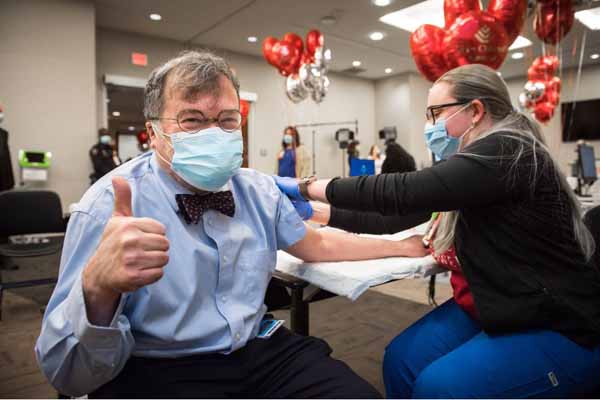
Physicians will have a new vaccine in their arsenal to help protect against respiratory syncytial virus (RSV), a timely development as cold, flu, and COVID-19 illnesses tend to converge and ramp up this time of year and become difficult to differentiate.
The U.S. Food and Drug Administration (FDA) also recently approved updated COVID-19 shots that target the widely circulating omicron-descended strains of the coronavirus
Physicians should remind patients to test for and vaccinate against all three viruses, says Trish Perl, MD, chair of the Texas Medical Association’s (TMA’s) Committee on Infectious Diseases.
“These are the respiratory viruses we see seasonally, usually in the fall and winter, that can cause serious illness in young children, the elderly, and people who are immunocompromised,” she said.
TMA has created a chart to help physicians and patients sort through vaccine eligibility and coverage.
Recently approved by the FDA, the RSV vaccine is recommended for people who are 60 years of age and older, since they are at higher risk for severe disease. The vaccine is also recommended for pregnant women seasonally in the eighth month of their pregnancy. The purpose of the vaccine for this group is to prevent RSV in infants after they are born.
“RSV is the single most important cause of hospitalizations in children,” for example, Dr. Perl said. Many children were hospitalized last year because of serious RSV cases.
And over the past few weeks, hospitalizations involving omicron subvariants of coronavirus have spiked. The omicron variant caused record hospitalizations during the height of the pandemic, though the situation is not as dire now.
Dr. Perl said it is important to get the COVID-19 booster shot because “like the flu, the coronavirus is evolving, and it could become a seasonal virus.”
The current recommendation is to get the COVID vaccine and the flu shot at the same time.
With RSV, flu, and COVID presenting similar symptoms, knowing which virus is making someone severely sick is important for physicians treating serious cases because “we approach these differently in different patient populations,” Dr. Perl said.
The Dallas infectious diseases specialist warns that while patients have become accustomed to using COVID-19 test kits at home, they are not always accurate and cannot test for the flu or RSV. Even if the COVID-19 test shows a negative result, she says it is important for physicians to remind patients at risk to get tested at a physician’s office, clinic, or hospital, which can test for all three viruses so patients can get the care they need.
“All three viruses can lead to hospitalization, lost work, and missing school, and all have economic consequences,” said Dr. Perl.
Legal Disclaimer